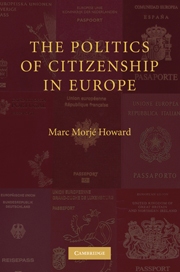Book contents
- Frontmatter
- Contents
- List of Figures
- List of Tables
- Preface
- Introduction
- PART I ARGUMENT
- PART II CASES
- 4 Liberalizing Change
- 5 Restrictive Continuity
- 6 Partial Liberalization with a Restrictive Backlash
- 7 Citizenship Battles in the Historically Liberal Countries
- 8 The New European Frontier
- Conclusion
- Appendix I Detailed Breakdown of the Three CPI Components
- Appendix II Naturalization Rates for the EU-15
- References
- Index
6 - Partial Liberalization with a Restrictive Backlash
Germany
Published online by Cambridge University Press: 05 June 2012
- Frontmatter
- Contents
- List of Figures
- List of Tables
- Preface
- Introduction
- PART I ARGUMENT
- PART II CASES
- 4 Liberalizing Change
- 5 Restrictive Continuity
- 6 Partial Liberalization with a Restrictive Backlash
- 7 Citizenship Battles in the Historically Liberal Countries
- 8 The New European Frontier
- Conclusion
- Appendix I Detailed Breakdown of the Three CPI Components
- Appendix II Naturalization Rates for the EU-15
- References
- Index
Summary
INTRODUCTION
In the realm of citizenship policy, no country has received nearly as much attention – or criticism – as Germany. Until recently, Germany was generally viewed as having an outdated and restrictive policy that was impervious to demographic realities and liberalizing pressures and trends. Indeed, in his thorough account of the history and trajectory of Germany's citizenship policy, Rogers Brubaker wrote in 1992 that “the automatic transformation of immigrants into citizens remains unthinkable in Germany.” Yet despite many predictions of continuity, Germany's policies have undergone considerable changes over the past decade. Not only were naturalization requirements loosened somewhat in 1993, but much more importantly, a major new Nationality Act was approved in 1999 and took effect in 2000. As a result, the Citizenship Policy Index (CPI) score for Germany increased from a 0 in the 1980s to a 2.04 in 2008. Nonetheless, the extent of the change remains an open question, and a careful examination of the evidence suggests that it may still be too early to categorically reject the “spirit” of Brubaker's assessment.
This chapter focuses on the German case in much greater depth than the mini case studies of the comparative chapters. Unlike most other countries, German citizenship policy has been the subject of a vast and rich scholarly literature. Moreover, this more detailed analysis allows me to incorporate the findings of some of my own interviews with German policymakers.
- Type
- Chapter
- Information
- The Politics of Citizenship in Europe , pp. 119 - 147Publisher: Cambridge University PressPrint publication year: 2009



